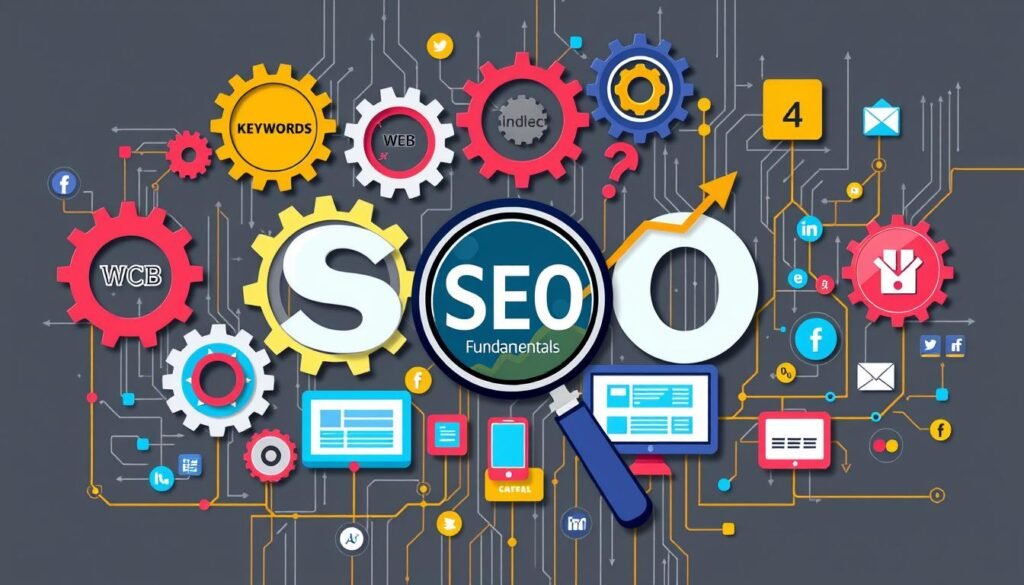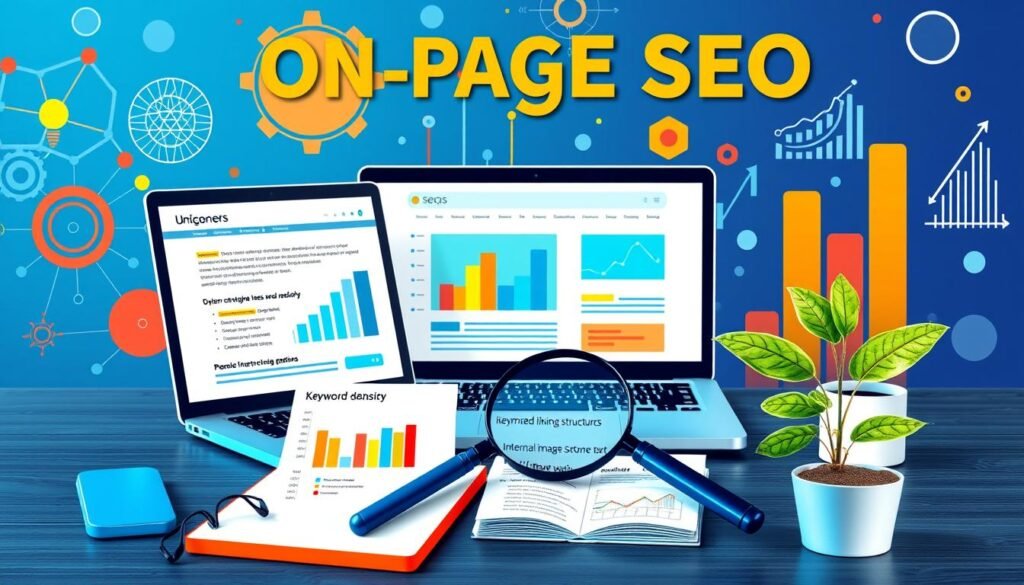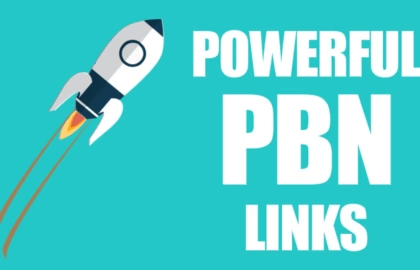SEO? Did you know over 90% of all online experiences start with a search engine query? This is a huge number that shows how important SEO is for businesses and website owners. In today’s world, having a strong online presence is key to attracting customers and growing your audience.
In this guide, we’ll explore the basics of SEO. We’ll look at the concepts, strategies, and best practices to boost your website’s visibility. This guide is for both beginners and those looking to improve their SEO skills. It will give you the knowledge and tools to succeed.

Key Takeaways
- Search engine optimization (SEO) is the process of improving a website’s visibility and ranking in search engine results pages (SERPs).
- SEO is crucial for businesses and website owners to attract more organic traffic and reach potential customers.
- This guide covers the fundamentals of SEO, including how search engines work, the role of algorithms, and key terminology.
- The guide also delves into essential SEO strategies, such as keyword research, on-page optimization, technical SEO, content creation, and link building.
- By implementing the strategies outlined in this guide, you can enhance your website’s search engine visibility and drive more qualified leads and conversions.
Understanding Search Engine Optimization Fundamentals
Getting into search engine optimization (SEO) can feel overwhelming. But knowing the basics is key for anyone with a website or working in digital marketing. At the core of SEO are the complex systems of search engines and their algorithms.
How Search Engines Work
Search engines like Google, Bing, and Yahoo use a method called crawling and indexing. Their bots, or “spiders,” are always online, exploring the web and finding new pages. They collect data and store it in the search engine’s index. This makes it easy to show the best results when someone searches.
The Role of Algorithms in Search Rankings
Search engine algorithms are always changing, but their main goal is the same. They aim to show users the most useful and relevant info for their searches. These algorithms look at things like content quality, keywords, and backlinks to figure out a page’s ranking.
Key SEO? Terminology You Need to Know
- Crawling: The process by which search engine bots discover and gather information about web pages.
- Indexing: The act of storing and organizing web page data in a search engine’s database, allowing for quick retrieval.
- Search Engine Algorithms: The complex formulas used by search engines to determine the relevance and ranking of web pages.
- SEO Glossary: A comprehensive collection of terms and definitions related to search engine optimization.
Grasping these basic ideas is the first step to mastering SEO. It helps you make your website more visible and improve its ranking in search engines.

SEO? Your Most Common Questions Answered
Many people and businesses are curious about search engine optimization (SEO). It’s a key part of digital marketing. We’ll cover some common SEO FAQs to explain the basics and clear up misconceptions.
What exactly is SEO?
SEO, or search engine optimization, makes your website more visible online. It aims to get your content to show up higher in search results. This helps more people find and visit your site.
How do search engines work?
Search engines have complex algorithms to rank websites. They look at things like how relevant your content is and how easy it is to use. Knowing how these algorithms work helps you improve your website’s ranking.
Is SEO just about keywords?
No, SEO is more than just keywords. Keywords are important, but SEO also involves making your website easy to understand and navigate. This includes on-page optimization, technical optimization, and creating quality content.
“SEO is not just about keywords, but about creating a website that is easy for search engines to understand and navigate.”
How long does it take to see results from SEO?
Seeing results from SEO can take different amounts of time. It depends on how competitive your field is, your website’s age and authority, and your SEO strategies. Be patient and invest time and resources into your SEO efforts.

SEO is a continuous process. Always be improving and refining your strategy for lasting success in search engine results.
Essential Elements of Keyword Research and Implementation
Starting with good keyword research is key to a strong SEO plan. Knowing what your audience searches for helps your content rank better. This attracts the right visitors to your site. Let’s look at the main parts of keyword research and how to use them.
Tools for Effective Keyword Research
Many tools can help find great keywords. Google Keyword Planner, SEMrush, Ahrefs, and Moz Keyword Explorer are popular choices. They give info on how often people search, how competitive it is, and related keywords. This helps find the best keywords for your business.
Understanding Search Intent
It’s not just about the number of searches or competition. You also need to know why people are searching. Are they buying something, looking for info, or trying to solve a problem? Matching your content to what users want increases your page’s ranking and user satisfaction.
Long-tail vs. Short-tail Keywords
Choosing between long-tail and short-tail keywords is important. Long-tail keywords are specific and have lower search volume but higher conversion rates. Short-tail keywords are broader and have more searches but more competition. A good strategy uses both to reach more people and meet different needs.

“Effective keyword research is the backbone of any successful SEO campaign. It’s the key to understanding your target audience and creating content that resonates with their needs and interests.”
Using the right tools, understanding search intent, and balancing keyword types is crucial. This helps your site rank better and attract the right visitors. Next, we’ll look at on-page optimization to boost your SEO even more.
On-Page Optimization Techniques That Drive Results
Search engine optimization (SEO) focuses on on-page optimization for lasting results. On-page SEO includes techniques to make your web pages more visible to search engines and better for users. We’ll look at key on-page optimization methods to boost your content’s performance.
Meta Tag Optimization
Meta tags are key in on-page SEO. They give search engines important details about your page, like its title, description, and keywords. Writing good meta tags can help your content show up in search results more often.
Content Optimization
Creating top-notch, informative content is the base of good on-page SEO. It means using target keywords naturally in your text. Also, using headings, subheadings, and bullet points makes your content easier to read and understand.
Internal Linking
Building a solid internal linking structure is a great on-page SEO tactic. It links your pages to other relevant content, making your site easier for search engines to crawl. This can improve your SEO performance.
Keep in mind, on-page SEO is a continuous effort. Regularly checking and improving your optimization can greatly enhance your website’s search rankings and user interaction.

Technical SEO: Building a Strong Foundation
As an SEO enthusiast, I’ve learned how vital technical SEO is. It’s key to a strong online presence. We’ll explore the main parts of technical SEO that make a website well-optimized.
Site Speed Optimization
In today’s fast world, site speed matters a lot. It affects both user experience and search rankings. You can make your site faster with image compression and code minification. These steps help keep your visitors happy and engaged.
Mobile-First Indexing
More people use mobile devices now. Search engines focus on mobile versions of websites first. It’s crucial to have a mobile-friendly site with a responsive design and optimized content.
XML Sitemaps and Robots.txt
XML sitemaps and robots.txt files are also important. They help search engines understand your website. By setting them up right, your important pages get found and ranked better.
By focusing on these technical SEO areas, you’re building a solid base for online success. A strong technical setup is the foundation for your SEO to grow.

Creating Content That Ranks: Best Practices
In the world of content marketing, SEO content creation, and content strategy, making high-quality content is key. It must rank well in search engines. Here, I’ll share top tips for making content that grabs your audience’s attention and boosts search visibility.
Starting with planning and research is crucial. Before writing, do deep keyword research. Find out what your audience is searching for. This makes your content match their needs and boosts your search ranking.
Optimizing for featured snippets is also vital. Featured snippets are short answers at the top of search results. By answering common questions or giving clear steps, you can get featured.

Adding multimedia elements like images, videos, and infographics can make your content better. Search engines favor diverse media, making your content more engaging and informative.
By using these content marketing, SEO content creation, and content strategy tips, you can make content that attracts your audience and ranks high in search engines. This drives more traffic and leads to your business.
Link Building Strategies for Better Authority
Creating a strong online presence is more than just making great content. It also needs a smart link building strategy. As someone who loves SEO, I’ve found that getting quality backlinks and improving your internal links are key. They help boost your site’s authority and better your search rankings.
Building Quality Backlinks
Getting quality backlinks from trusted sites is a great way to boost your site’s authority. You can do this by guest posting on top blogs, working with other businesses, or getting mentions from your network. The goal is to use link building that really helps your audience, not just any old backlinks.
Internal Linking Structure
Improving your site’s internal linking is also important. By linking your pages smartly, you make your site easier to use and search engines love it. This shows them that your content is valuable and authoritative.
Avoiding Common Link Building Mistakes
Link building is powerful, but you must avoid common mistakes. Don’t buy links, swap too many, or get backlinks from low-quality sites. Focus on quality over quantity to build a strong backlink profile. This helps your overall authority building efforts.
| Tactic | Objective | Benefits |
|---|---|---|
| Guest Posting | Secure high-quality backlinks from industry-leading websites | Increases authority, boosts brand visibility, and drives referral traffic |
| Broken Link Building | Identify and replace broken links on relevant websites with your content | Earns backlinks, improves user experience, and demonstrates your expertise |
| Skyscraper Technique | Create content that is superior to existing industry-leading articles | Attracts backlinks from sites looking to reference the best resources |

Remember, it’s not about how many links you get, but their quality. By focusing on building backlinks from good sources and improving your internal links, you can make your site more authoritative. This will help your search rankings over time.
Local SEO: Dominating Your Geographic Market
As a business owner, you know how key it is to reach local customers. Local SEO helps you do just that. It makes your business more visible in local search results, helping you connect with the right people.
Google My Business is a big part of local SEO. Make sure to claim and optimize your Google My Business listing. This ensures your business info is correct and up-to-date. It helps you show up in local search results and on Google Maps, making it easier for people to find you.
Managing your local citations is also crucial. Local citations are mentions of your business on other websites, like directories and review sites. Keeping your business name, address, and phone number (NAP) consistent across these sites can really help your local search rankings.
Geo-targeting is another important part of local SEO. It means making your website and content specific to certain areas. By knowing what your local audience is searching for, you can tailor your content to better meet their needs.
- Claim and optimize your Google My Business listing
- Manage your local citations for consistent NAP information
- Implement geo-targeting techniques to reach local customers
By getting good at these local SEO strategies, you can build a strong online presence in your area. Remember, the goal of local SEO is to understand your audience and give them the most relevant information.

Measuring Success: SEO Analytics and KPIs
As a savvy marketer, I know how key it is to track your SEO efforts. You can’t improve what you don’t measure. So, diving into SEO analytics and KPIs is vital for any digital marketing strategy.
Essential SEO Metrics to Track
There are key metrics to watch for in SEO. These include organic traffic, keyword rankings, bounce rate, and conversion rates. By tracking these, you can see how your site is doing and where it needs work.
Using Google Analytics for SEO
Google Analytics is a top tool for SEO pros. It offers lots of data and insights. You can see how users behave, find top content, and track your SEO success. It’s full of SEO analytics.
ROI Measurement Techniques
The main goal of SEO is to get a good return on investment (ROI). To measure ROI, track lead generation, sales, and revenue. This shows how your SEO affects your profits, helping you make better choices.
Understanding SEO analytics and KPIs is crucial for marketers. With data-driven insights, you can improve your site, create better content, and get better results for your business.
Conclusion
SEO is a complex field that needs a strategic plan to boost your website’s visibility. By learning the basics of SEO, you can create a winning strategy. This guide has given you the tools to improve your website’s performance online.
Understanding search engines and their algorithms is key. You also need to do thorough keyword research and use on-page optimization techniques. With these skills, you can increase your website’s ranking and attract more visitors.
SEO is a continuous effort that needs constant improvement. Stay updated with the latest SEO practices. By doing so, you’ll keep delivering value to your audience and stay ahead in your field.
FAQ
What is SEO and why is it important for my business?
SEO, or search engine optimization, makes your website more visible online. It helps attract more visitors, which can boost your brand and sales. This is why it’s key for your business.
How do search engines work, and how do they determine website rankings?
Search engines use complex algorithms to rank websites. They look at content quality, relevance, and user experience. Knowing how these algorithms work helps improve your website’s ranking.
What are the most important SEO elements I need to focus on?
Focus on keyword research, on-page optimization, technical SEO, and link building. These areas are crucial for better search rankings. Regularly applying best practices in these areas can greatly improve your website’s visibility.
How can I conduct effective keyword research for my business?
Keyword research finds the terms your audience uses to find your products or services. It involves understanding search intent and using tools to find valuable keywords. This helps you target the right audience.
What are some of the best on-page optimization techniques I should be using?
Improve your website with optimized page titles, meta descriptions, and header tags. Also, focus on image alt text, internal linking, and creating quality content. These practices enhance your website’s visibility in search engines.
How important is technical SEO, and what elements should I focus on?
Technical SEO ensures search engines can crawl and understand your website. Focus on site speed, mobile design, XML sitemaps, and robots.txt files. Fixing technical issues is essential for your SEO success.
What are the best strategies for building high-quality backlinks to my website?
Build backlinks by creating shareable content, guest posting, and fixing broken links. Also, participate in online communities. Aim for natural, contextual backlinks to boost your website’s authority.
How can I optimize my website for local search visibility?
Optimize for local searches by claiming your Google My Business listing and building local citations. Use location-based keywords and ensure your site is mobile-friendly. This helps attract nearby searchers.
What are the most important SEO metrics and KPIs I should be tracking?
Track organic traffic, keyword rankings, bounce rate, and conversion rates. Google Analytics provides insights into your SEO success. Use this data to refine your strategy.






